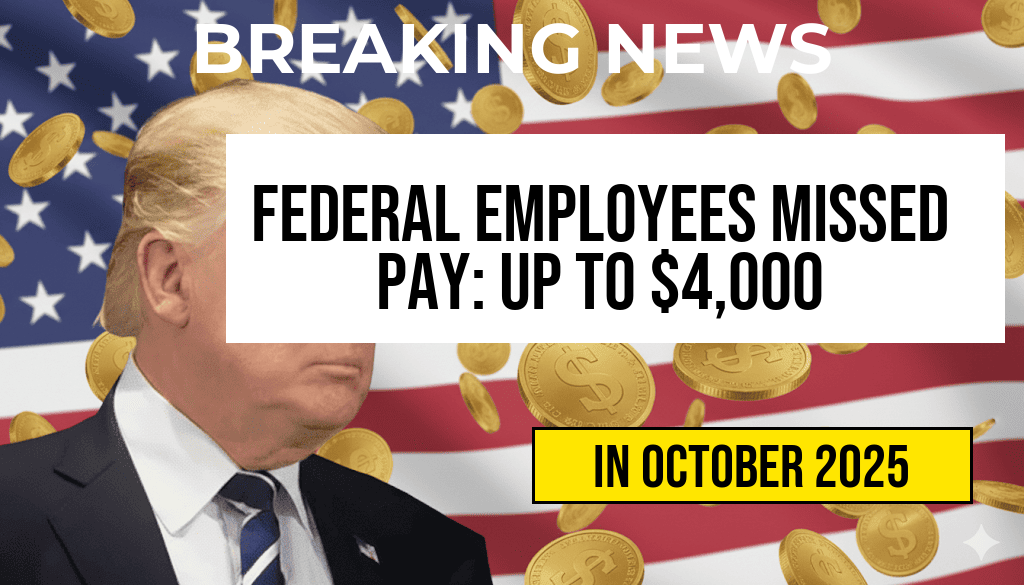Federal Employees Face Financial Strain as Missing Two Paychecks Can Cost GS-12 Workers Up to $4,000
Thousands of federal employees, especially those classified as GS-12, are confronting a significant financial setback after delays in their paychecks due to ongoing government funding issues. Missing two consecutive pay periods can equate to a loss of up to $4,000 for many, creating immediate hardships for employees who rely on regular income to cover essential expenses. This situation underscores the vulnerabilities faced by federal workers amid budget impasses and government shutdown threats. With pay disruptions affecting personal finances, many are searching for viable solutions to mitigate the impact, from financial assistance programs to emergency planning. As disruptions continue, understanding the scope of the problem and available resources becomes crucial for federal employees seeking to navigate these uncertain times.
Understanding the Financial Impact of Missed Paychecks
How Much Can Missing Two Paychecks Cost GS-12 Employees?
| Pay Grade | Average Monthly Salary | Paycheck Amount | Total Loss for Two Paychecks |
|---|---|---|---|
| GS-12 | $85,000 | $4,250 | $8,500 |
For GS-12 employees, whose annual salaries typically hover around $85,000, each biweekly paycheck averages approximately $4,250. Missing two of these pay periods can lead to a financial shortfall approaching $8,500. However, individual take-home pay varies depending on locality pay, deductions, and other factors. Still, the core issue remains: the inability to access expected income can significantly disrupt personal budgets, leading to missed bill payments, late fees, and increased financial stress.
What Are the Causes Behind the Pay Delays?
Government Funding Disruptions and Shutdowns
Pay delays often result from temporary government shutdowns, funding lapses, or administrative delays. When Congress fails to pass appropriations bills or continuing resolutions, agencies may operate under partial funding, which can halt payroll processing. The recent recurring shutdown threats have heightened concern among federal workers, especially as they await clarity on budget negotiations. According to official reports, during shutdowns, paychecks are often delayed or issued with a lag, impacting thousands of federal employees nationwide.
Administrative Processing and Bureaucratic Challenges
Beyond funding issues, internal administrative hurdles can also cause delays. These include errors in payroll processing, system outages, or delays in updating employee records. While less common, these issues compound the financial challenges faced by employees, especially when compounded with broader government funding problems.
Resources and Strategies for Federal Employees Facing Financial Hardship
Immediate Financial Assistance Options
- Emergency Loans: Some federal agencies offer emergency loans or advances to employees experiencing financial hardship. Employees should consult their HR departments for guidance on eligibility and application procedures.
- Federal Employee Emergency Relief Fund: Managed by various unions and organizations, this fund provides short-term financial relief for affected workers.
- Credit Unions and Local Banks: Many credit unions serving federal employees offer small, low-interest emergency loans or assistance programs during pay disruptions.
Long-Term Solutions and Financial Planning
Employees are encouraged to review their personal finances and build emergency savings to buffer against future disruptions. Setting aside at least three to six months’ worth of expenses can provide a safety net during periods of income uncertainty. Additionally, exploring payment deferrals or negotiating flexible payment plans with creditors can help manage immediate obligations.
Understanding Legal Protections and Rights
Federal employees have certain protections under the law. For example, the Office of Personnel Management (OPM) advises employees on rights during pay delays. In cases where pay delays are due to administrative errors, employees may have legal recourse to seek back pay or compensation. Consulting with union representatives or legal counsel can clarify individual rights and options.
Steps to Take If You Miss a Paycheck
Assess Your Financial Situation
Review your bank account to determine the exact amount received and identify any pending deposits or payments. Prioritize essential bills such as rent or mortgage, utilities, and groceries.
Communicate with Creditors and Service Providers
Notify lenders, utility companies, and service providers about potential delays. Many companies are willing to offer temporary relief or payment extensions in cases of proven hardship.
Consult Your HR Department or Payroll Office
Reach out promptly to your agency’s payroll or human resources office for updates on the payment status and guidance on next steps. They can also inform you about any available emergency funds or assistance programs specific to your agency.
Looking Ahead: Policy Changes and Advocacy
Continued disruptions highlight the need for systemic changes to safeguard federal workers’ financial stability. Advocacy groups are urging lawmakers to establish contingency measures that ensure timely pay regardless of funding disputes. Some proposals include automatic funding mechanisms or dedicated emergency funds to prevent future delays.
For more information on your rights and resources, visit FedWeek or consult official guidance from the Office of Personnel Management.
Frequently Asked Questions
What are the potential financial impacts of missing two paychecks for federal employees at GS-12 level?
Missing two paychecks can cost GS-12 federal employees up to $4,000 in lost income, affecting their ability to cover essential expenses and manage financial obligations.
What steps should federal employees take if they miss a paycheck?
If a federal employee misses a paycheck, they should contact their agency’s human resources or payroll office immediately to report the issue and seek guidance on resolving the payment delay.
How can federal employees prevent issues with missing paychecks?
To prevent missing paychecks, federal employees should regularly verify their payroll information, ensure direct deposit details are correct, and promptly report any discrepancies or issues to their payroll office.
What options are available if a federal employee faces financial hardship due to missed paychecks?
Federal employees experiencing financial hardship may explore emergency assistance programs, short-term loans, or speak with their agency’s financial counseling services for support and advice during such times.
Who should federal employees contact for assistance if their paycheck is delayed or missing?
Employees should contact their agency’s payroll or human resources department as the first step. If needed, they can also reach out to the Office of Personnel Management or the Federal Employee Program for additional support.

Leave a Reply